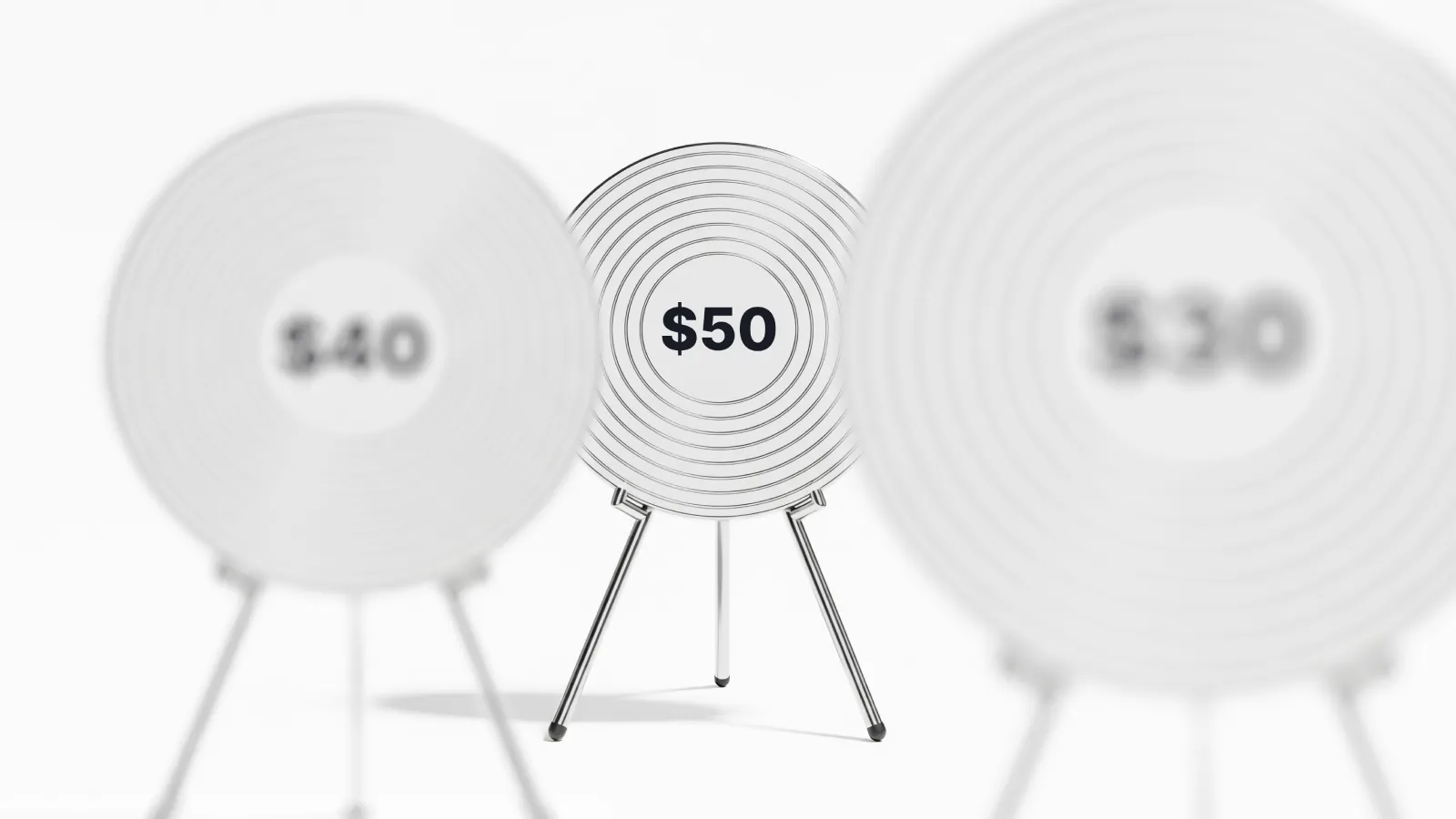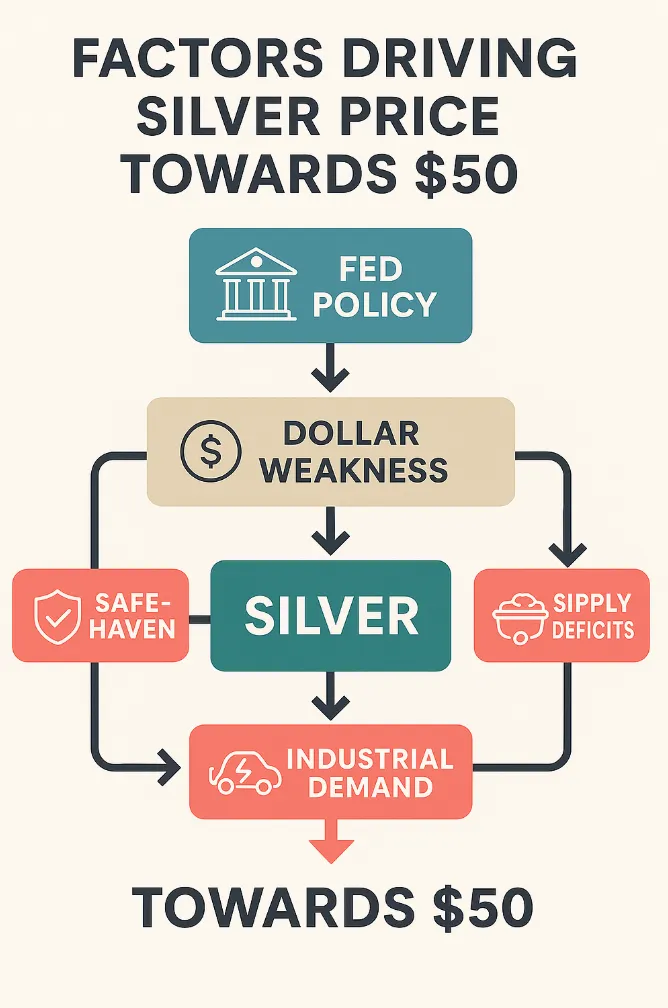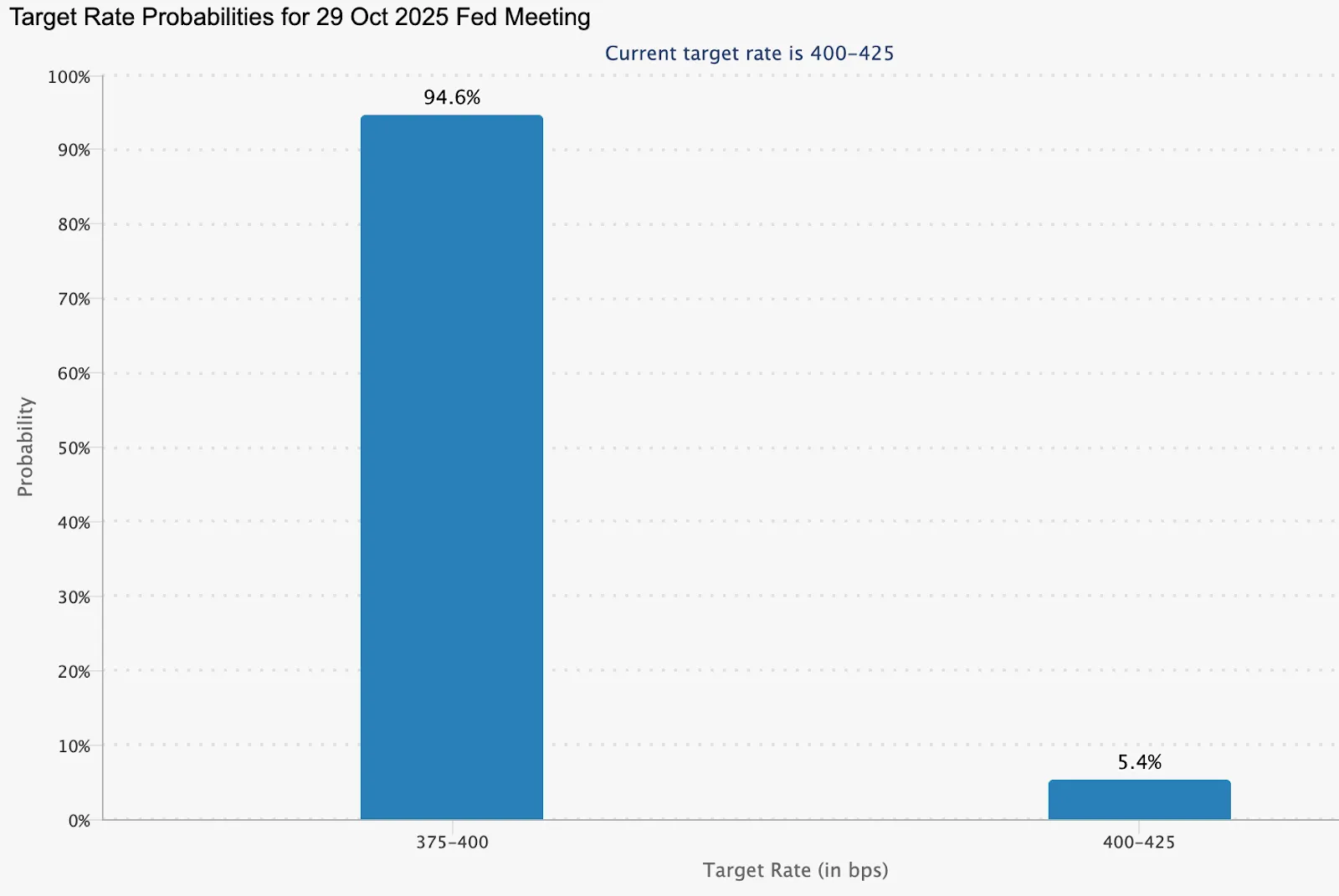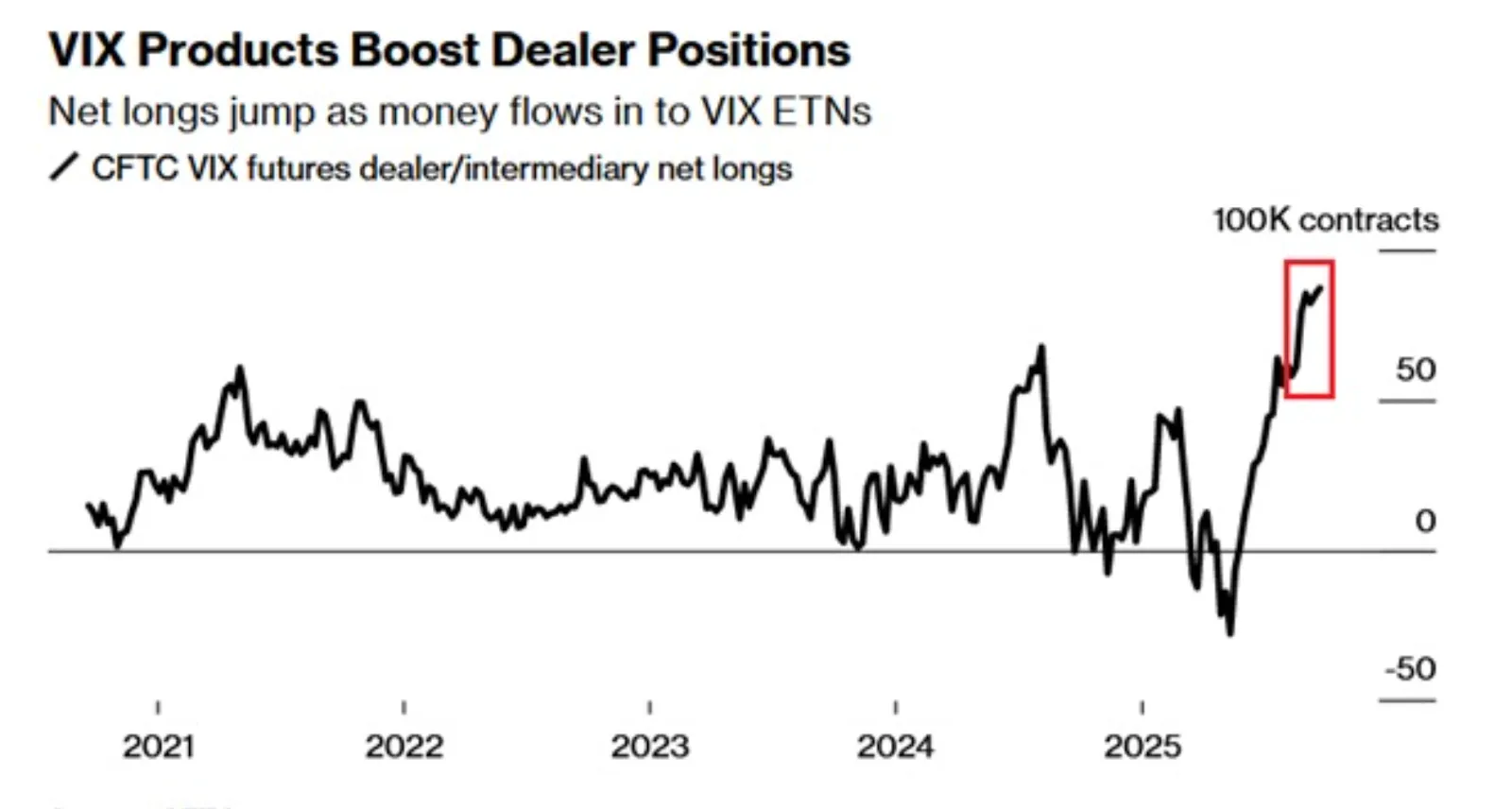Silver price prediction 2025: Analysts see $50 in play but will it hold?

Yes, silver - one of the world’s most actively traded commodities - has a credible chance of breaking its 1980 and 2011 records as it approaches $50 in 2025, according to experts. The metal has already surged 55% this year, climbing from $29 in January to nearly $47 in September, its highest quarterly close on record. The rally is underpinned by safe-haven demand amid political uncertainty, Federal Reserve rate cuts, persistent supply deficits, and record industrial use in sectors like solar and electric vehicles.
With demand projected to outstrip supply by more than 100 million ounces in 2025 and investor inflows into silver ETFs close to historic highs, analysts see $50 as a realistic near-term target. The main question is whether silver clears this level in the next leg higher or pauses for a correction before breaking through.
Key takeaways
- Silver is up 55% YTD in 2025, outperforming gold in percentage terms.
- Fed rate cuts and dollar weakness reduce the cost of holding non-yielding assets.
- Industrial demand above 700 Moz is driven by solar, EVs, and electronics.
- Supply shortfall: global output (~844 Moz) trails demand, creating a 100 Moz+ deficit for a fifth straight year.
- Investor flows: Silver ETP holdings rose 95 Moz in H1 2025 to 1.13 billion ounces.
- Volatility hedges surged: net dealer long VIX positions at 87,000 contracts, $VXX assets up 312% YoY.
- Risks: retail speculation in equities diverts flows, and profit-taking can spark pullbacks.

Silver safe-haven demand: Political risk insight
Silver’s surge has been reinforced by safe-haven flows tied to U.S. political uncertainty. Ahead of midnight on 30 September, fears of a government shutdown saw investors shift into gold and silver. Analysts agree the risk alone - even without an actual shutdown - heightened demand as markets priced in disruption to government services and data releases.
At the same time, geopolitical tensions, from renewed fighting in Ukraine to conflict risks in the Middle East, add to silver’s safe-haven appeal alongside gold.
Federal Reserve policy and the dollar backdrop
The U.S. Federal Reserve has turned from tightening to a fed rate cut. A 25-basis-point cut in September -its first in years - set expectations for another in October, with markets pricing an 94.6% chance of a follow-up cut.

Inflation data (PCE) confirmed inflation staying above the Fed’s target rate, reinforcing the narrative of a follow-up cut. Lower rates reduce the opportunity cost of holding bullion, while dollar weakness makes silver cheaper for overseas buyers. This monetary backdrop is seen as one of the strongest drivers behind silver’s 2025 rally.
Industrial demand is driving structural growth
Silver’s demand story extends well beyond safe-haven flows. The silver industrial demand forecast shows consumption staying above 700 Moz in 2025, supported by three major sectors:
- Solar energy: Silver’s conductivity is critical for photovoltaic cells.
- EVs: Electric vehicles require far more silver than traditional cars, from batteries to charging infrastructure.
- Electronics: Global consumer and industrial electronics continue to underpin usage.
These drivers consumed record volumes in 2024 and are set to accelerate further in 2025. Analysts see this clean-energy shift as a structural support for silver prices regardless of short-term macro volatility.
Silver supply deficit: Silver investment outlook 2025
Global silver production is expected to be near 844 Moz in 2025, insufficient to meet demand. With roughly 70% of silver mined as a byproduct of base metals, supply does not rise in response to higher silver prices.
Structural challenges - falling ore grades, regulatory hurdles, and investment delays - add further limits. The Silver Institute forecasts a fifth consecutive annual deficit in 2025, with demand surpassing supply by more than 100 Moz. This imbalance supports a longer-term bullish outlook.
Investor flows and market sentiment
Investment demand has amplified the rally. Silver-backed ETP holdings increased by 95 Moz in H1 2025, bringing global totals to 1.13 billion ounces - close to historic peaks. Within this broader category, silver ETF holdings 2025 have been a key driver of momentum, reflecting strong investor appetite for exposure through funds.
Silver ETFs have delivered gains of 54% YTD, attracting momentum-driven investors. Regionally, India’s retail demand rose 7% YoY, while Europe’s market is recovering.
At the same time, volatility hedges have surged:
- Net dealer long positions in $VIX reached 87,000 contracts, the highest in four years.
- The largest VIX ETN, $VXX, saw assets jump 312% YoY to nearly $1 billion.
- Leveraged product $UVIX recorded 215% inflows.

This reflects broad caution in markets - a factor that typically benefits safe-haven metals.
Short-term risks: Retail frenzy and corrections
Despite strong fundamentals, risks remain. U.S. retail traders have driven call-option volumes to a record 9 million contracts (5-day avg) - nearly double puts and triple 2020 levels - signalling aggressive risk-on positioning. This speculation in equities can divert flows away from safe-haven metals.

Analysts also note that dips in silver reflect technical profit-taking rather than a reversal of trend. In other words, while silver may pause before $50, the medium-term drivers remain intact.
Silver technical insight
At the time of writing, Silver is in price discovery mode, testing levels it last hit back in 2011 - hinting at a potential further uptick. However, the volume bars show significant seller pushback, which could put pressure on prices and lead to a consolidation if buyers don’t push with more conviction. With enough seller pushback, we could see prices retreat towards the $44.00 support level, with further support levels at $40.73 and $37.45.

Investment implications
For investors, silver’s setup in 2025 is defined by tight supply and dual demand.
- Short-term: We could see volatility around the $50 level. Corrections are likely, but dips may offer buying opportunities if Fed cuts and volatility fears persist.
- Medium-term: Persistent deficits and structural demand growth suggest silver could break through $50 and sustain higher levels.
- Market positioning: Silver miners stand to benefit from strong prices, while industrial users may face cost pressures. Traders should prepare for volatility, with a bias toward upside as long as macro and industrial trends remain supportive.
Trading Silver’s approach to $50
As silver edges closer to the $50 mark, traders are watching for opportunities. The way you might trade this move depends on your style and time horizon. Below are common approaches used in the markets, explained for educational purposes.
1. Short-term traders: Riding the volatility
- How they trade: Short-term traders often look for quick price swings around key levels such as $47–$48. Breakouts and pullbacks can be entry points, but they usually keep positions smaller to avoid being caught by sudden reversals.
- Risk practices: Protective tools like stop-loss or trailing stops are commonly used to manage exposure.
- On Deriv: Silver can be traded as XAGUSD CFDs on Deriv MT5, offering flexible contract sizes and leverage.
2. Medium-term traders: Following the trend
- How they trade: Medium-term participants tend to focus on trend continuation signals - for example, watching whether silver forms higher lows or holds above support.
- Risk practices: Scaling into positions over time rather than committing all capital at once helps spread risk.
3. Long-term investors: Building exposure gradually
- How they trade: Investors may prefer gradual accumulation, treating dips as opportunities to add exposure rather than aiming to time the perfect entry.
- Risk practices: Balancing silver with other commodities or assets can help avoid overconcentration.
- On Deriv: Silver is available via commodities and ETF-inspired products on Deriv Trader. A demo account allows you to explore strategies before committing funds.
4. Universal step: Practise first
Regardless of style, many traders test strategies in a demo environment before trading live. Silver is known for sharp moves, so simulated trading can help you see how it reacts at different levels without real risk.
Disclaimer:
The performance figures quoted are not a guarantee of future performance.



